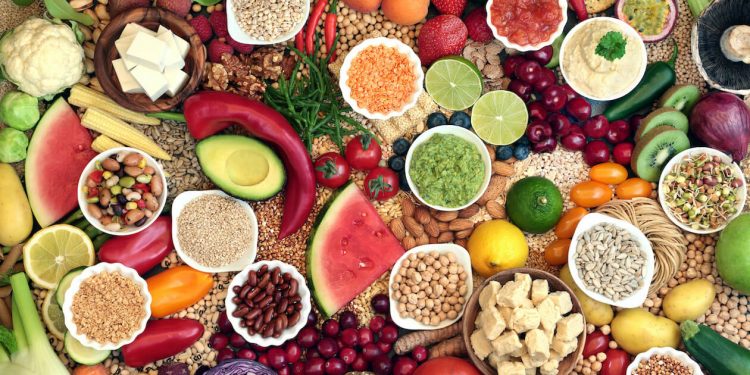Apart from practices such as use of masks, maintaining social distance and hand hygiene, another change that Covid-19 has brought about is veganism.
After learning about the role veganism plays not only in combating the pandemic but also how it can help in dealing with climate crisis, more and more people are adopting a vegan lifestyle.
They not only abstain from consuming animal products, but also from wearing or purchasing leather or other products made from animals. They use products that are cruelty-free and not tested on animals and choose forms of entertainment that do not engage animals.
Talking about India, it is a country where animals are worshipped, loved, pampered and taken care of just as any other family member. No wonder, India is said to have the most numbers on the chart of followers of veganism.
Therefore, it can be safely assumed that veganism is set to become the new normal in a post pandemic world.
Ahead of World Vegan Day November 1, a few advocates of veganism shared with Sunday POST why it is important to be a vegan and what role it can play in overcoming the climate crisis.
A nutritionist and medical professional, Dr Kiran Ahuja, manager of Vegan Projects at PETA (People for Ethical Treatment of Animals) India says, “Veganism is part of India’s past and future”.
Talking about the history of this trending lifestyle she continues: “The origin of veganism dates back to when the first humans ate fruits, berries, nuts, and other foods that nourished them. Of course, people in India have been eating vegetables, fruits, pulses, grains, and other vegan foods for millennia.”
The Himalayan Brokpa People were strict vegans more than 5,000 years ago. At the heart of three of India’s major religions (Hinduism, Buddhism, and Jainism) lies ahimsa, and many Indians are vegan because of their belief in this principle of nonviolence towards sentient beings.
Today, India has the largest vegetarian population in the world (nearly 40% of us find eating animal flesh repulsive and do not eat meat), and in a recent span of 10 years, the number of vegans, including people from all religious backgrounds, have risen by 360%.
Thanks to public support for animal welfare, concerns about the negative environmental impact of meat and dairy farming, and worry about the increased rates of obesity, diabetes, heart disease, and high blood pressure, the vegan population keeps growing.
Ahuja says it’s quite natural for Indians to care about animals. The Sanskrit phrase “Vasudhaiva Kutumbakam” means “The World Is One Family” and the Constitution of India requires citizens to have compassion for animals, she points out.
Even as a big percentage of vegans live, there is no let up in cases of animal cruelty in the country. On this, she says it is all about creating awareness.
“When people will realise that billions of chickens are confined to cages so small they can’t even spread one wing just to produce eggs, that trillions of fish are suffocated or slit open for their flesh while they’re still alive, or that most calves are torn from their mother’s side shortly after birth and that many are killed simply so that humans can steal their milk, they will reject this violence by consuming exclusively vegan foods,” a confident Ahuja added.
It is not just about atrocities towards animals; by adopting a vegan lifestyle people can reduce the risk of their health disorders.
“A staggering 75% of us, along with the majority of the rest of the world, are lactose intolerant, meaning we can’t digest dairy. Doctors advise that consuming dairy can contribute to heart disease, various types of cancer (including reproductive, colon, and breast cancer), obesity, and other serious physical ailments”, she further says.
This apart, concerns over the climate catastrophe are also prompting more people to go vegan. A study by the Indian Institute of Technology Delhi and the Deenbandhu Chhotu Ram University of Science and Technology, Murthal found that the methane produced by India’s farmed animal population (the world’s largest) can significantly raise global temperatures.
Vivek Mallick, a student of Amity University-Kolkata, turned vegan as he believes that animals are living with and not for human beings.
He wants to set an example for others of how vital animals and nature is for humans, and that they have to be answerable to the choices they make.
Vivek says, “Veganism can trace its origin way back to ancient India, where people from different religions such as Hinduism, Jainism and Buddhism preached about Ahimsa and how every living being should be treated with love, care and respect. Although, it has taken a modern meaning nowadays where it has become a way of living which excludes as much as possible and practicable, all forms of exploitation and unnecessary cruelty towards other animals. When people introspect and realize about the meat, dairy and leather industry, they become more aware about their choices and what dire consequences it has on the lives of others, because someone in their sane state of mind can never commit such a heinous act of cruelty on an innocent creature for their needs”.
Shedding some light on veganism as a lifestyle, he continues: “One can choose to eat mock meat or vegetables rather than ending someone’s life for a five-minute pleasure. One can also choose to wear synthetic substitutes rather than silk or wool, and one must also boycott every kind of animal cruelty such as zoos, circuses, animal rides. If everyone were to adopt a vegan lifestyle, they would not only be able to keep their health in optimum conditions but also decrease greenhouse emissions and slow down global warming and climate change as the animal farming industry is the second largest emitter of greenhouse gases after the energy sector. People would not only be making a healthy choice but rather a humane choice also”.
Vivek, to popularise the practice of veganism, says, “In order to connect with the community, we have to start from the grassroots level and show people what the meat, dairy, leather and other animal dependent industries hide from them. Even children must be told the truth about these practices before they are brainwashed into believing the sweet lies. They must realise that chicken, fishes, goats, cows and all other animals know when they are going to be killed and they feel pain and fear such as ourselves, they just want to live freely just like us”.
Purabi Patra, a founder, chairperson animal welfare trust Ekamra, animal rights activist, and a vegan based in Bhubaneswar says, “Veganism as a lifestyle is not something we imagine as an out of world concept”.
“If we talk about vegan food, the daily staple food like (dal, chawal, roti, sabzi) we eat in our daily life is mostly vegan, chocolate, cheese, butter are anyways not good for health and should be avoided at least for your own health. No point in going for expensive leather items, when we have ample choices in synthetic accessories. Silk has never been a mandatory textile for us, and we have a lot of other options in fabric. So for me veganism as a lifestyle is damn easy, just that you need to take it positively,” she explains.
Nowadays social media is the best platform to explore the options, there are lots of forums and groups on veganism and vegan people, where one can join and explore the world of veganism.
Vegan Celebs
The concept of veganism has hogged the limelight of late and for that the credit must be given to some celebrities who keep away from animal and dairy-based products. While Indians like Aamir Khan, Esha Gupta, Alia Bhatt, John Abraham, R Madhvan, Kiran Rao, Virat Kohli, Neha Dhupia, Anushka Sharma, Sonam Kapoor have played big roles in growing popularity of veganism, Hollywood celebs of the likes of Tobie Mcquire, Liam Hemsworth, Natalie Portman, Anne Hathaway, Joaquin Phoenix, Pamela Anderson and Ariana Grande promote the practice aggressively.
Origin of Vegan Day
World Vegan Day was started in November 1944 by the Vegan Society, a group that was created by Donald Watson, an English animal rights advocate. The term ‘vegan’ was coined in place of ‘non-dairy vegetarian’. The word ‘vegan’ as Donald Watson described it, is the “beginning and the end of the word vegetarian”. The Vegan Society also celebrates Vegan month, in the month of November.
Debunking myths
Myth – Vegan food lacks protein
Fact – Lentils, beans, nuts, seeds, soybean and tofu are considered good sources of protein.
Myth: Fish are the only source of Omega-3
Fact: Apart from fish, Chia and flax are good dietary additions as they are rich in alpha-linolenic acid (ALA), which helps heart health, also known as sources of Omega-3.
Myth: Plants have feelings
Fact: Plants do not have a central nervous system. But if fruits are picked up from a tree it will not really hurt them. It’s just like clipping off a nail!
Myth: Veganism leads to malnutrition.
Fact: A balanced vegan diet is known to boost the immune system, enable better heart function, provide more endurance and promote healthier skin.






































